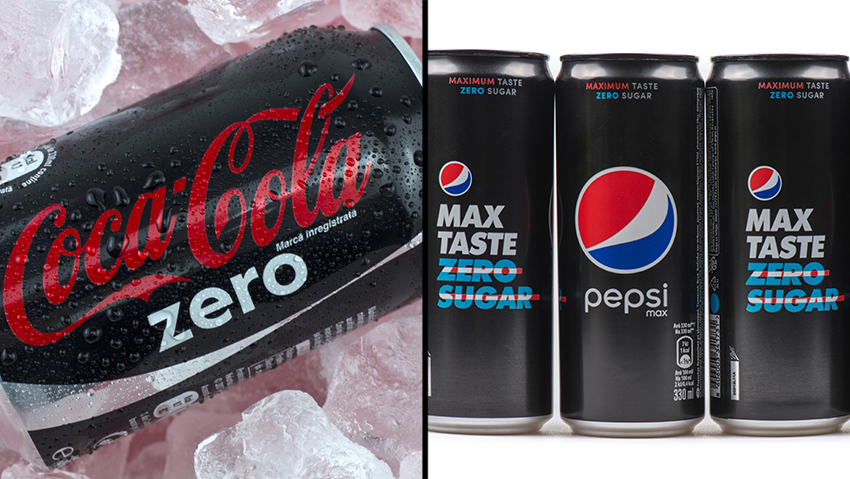The International Agency for Research on Cancer (IARC), an intergovernmental agency forming part of the World Health Organization, will announce in two weeks that aspartame, the popular artificial sweetener, is "possibly carcinogenic to humans."
This news has already caused a worldwide uproar due to concerns that diet products consumed by hundreds of millions of people for four decades may be harmful, and even carcinogenic.
What are the consequences of the expected announcement? How dangerous is dieting really? And is there a need for preliminary tests? We've got the answers.
What is aspartame?
Aspartame is an artificial sweetener that is commonly found in diet beverages, chewing gum, yogurt, food products, sugar substitutes and other food items. The substance was first discovered in 1965 by the American chemist James Schlatter and is about 200 times sweeter than sugar. Due to its intense sweetness, only a tiny amount is needed to achieve a similar taste to sugar. Aspartame was approved for use in 1974 by the U.S. Food and Drug Administration (FDA) as an artificial sweetener in food.
Why did aspartame become so popular?
Despite its intense sweetness, aspartame is nearly calorie-free and does not leave an aftertaste like other sweeteners such as saccharin.
What is the expected announcement from the WHO?
According to a report by the Reuters news agency, the International Agency for Research on Cancer (IARC), which is part of the World Health Organization, is expected to officially link the consumption of aspartame to cancer under a category called 2B, which means "possibly carcinogenic to humans." However, this link is far from leading to any definitive conclusion, as the same category includes other substances that are still in use, including various coloring agents, lead, radiofrequency electromagnetic fields and even aloe vera extract.
Is the announcement based on new research?
Most likely not. Experts from the IARC's cancer research branch have extensively reviewed the existing literature on the subject and have not conducted new research. The statement will likely be based on previously published studies in recent years that have highlighted the dangers of using aspartame.
To date, manufacturers have not been required to add such warnings to other food products, such as red meat, which fall under the same risk category, 2B
So what is the statement based on?
The World Health Organization and the IARC have not yet published the full decision protocol. However, according to available information, the experts have relied on 7,000 publications, including 1,300 studies conducted on animals and humans. The committee has not yet disclosed which tumors were found to have a higher prevalence among aspartame consumers or what the threshold level is that increases the risk.
Are diet products expected to include a cancer warning?
To date, manufacturers have not been required to add such warnings to other food products, such as red meat, which fall under the same risk category, 2B. Both the IARC and the WHO do not have the authority to enforce such a decision, given it is under the authority of the regulators in different countries, such as the FDA in the United States. It can be assumed that any attempt to include a cancer warning on diet products will face strong resistance from the soft drink and sweetener industry. Therefore, the announcement is not expected to lead to any significant change unless compelling and unequivocal evidence linking aspartame to cancer in humans is found.
How much aspartame is safe to consume?
According to the existing data, the recommended safe daily intake of aspartame is up to 50 mg per kilogram of body weight per day. This means that for a person weighing 60 kg, it is advised not to consume more than 3,000 mg of aspartame per day. The average amount of sweetener in a can of diet cola is 180 mg. Therefore, to exceed the maximum daily amount, one would need to consume more than 16 cans of diet cola in a day.
What does the Ministry of Health in Israel have to say?
In response to the news, the Ministry of Health said that its teams will study the report and its findings and act accordingly. The ministry emphasizes and recommends that the best way to maintain health and avoid unnecessary risks is to completely avoid sweetened beverages, whether with sugar or artificial sweeteners, and to avoid processed food.
Is there a reason to panic and undergo medical tests for cancer detection?
"There is no need to panic and certainly no need to undergo special tests for cancer detection, even for those who consume diet products," Professor Avishay Ellis, chairman of the Israel Society of Internal Medicine, told Ynet.
"Aspartame is a synthetic substance, and processed ingredients are not recommended extensively. However, further research and clarification will be required regarding aspartame before a definitive opinion can be established. Regardless, artificial sweeteners are not recommended, and the concept of 'diet' is misleading. People have false hopes in the use of diet products, which have not been proven to significantly contribute to weight loss. As always, we recommend a healthy and balanced diet and physical activity as the best way to maintain a proper weight," he said.



